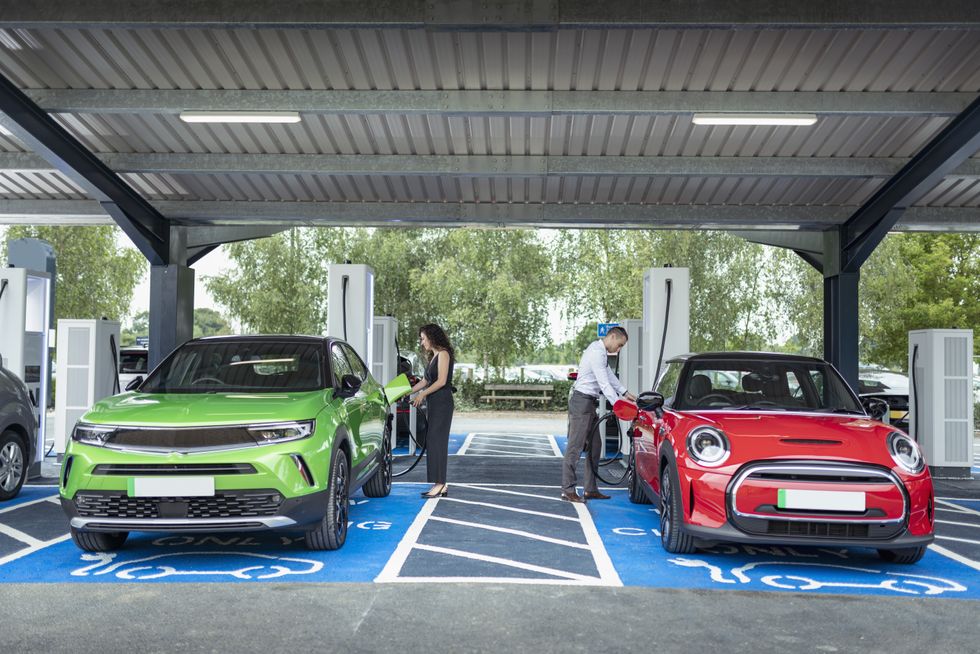There are believed to be more than 700,000 chargers at homes and workplaces
GETTY/PA
'Public charging doesn’t need to, and shouldn’t, be the primary focus of the conversation'
Don't Miss
Most Read
Trending on GB News
Britain's drivers are generally ready to make the switch to an electric vehicle, but a few critical hurdles stand in the way of this. Many are still concerned about the ways in which drivers can charge their vehicles efficiently and without worry that they might suddenly be stranded on the roadside.
There are more than 61,000 public chargers around the country already, with expectations that the 100,000th device will be installed next year. However, EV charging database Zapmap estimates that devices at houses and workplaces across the UK total more than 700,000 - a significant amount to boost faith in batteries.
To compound the interest in electric vehicles and get them out to the masses, home charging will be critical to work alongside public infrastructure. Whether people can charge their vehicles overnight or during the day at their workplaces, the Government and major chargepoint operators can rapidly boost faith in EVs.
Denis Watling, managing director at ChargeGuru UK, spoke to GB News about how drivers across the UK will feel more confident about switching to an electric vehicle if it was easy for them to have access to a charger at home and at work.
Do you have a story you'd like to share? Get in touch by emailingmotoring@gbnews.uk

There are a number of incentives that enable drivers to install a home charger
GETTYWith an increase in reliable infrastructure comes an increase in confidence, whether that’s public or private.
To date, conversations in the media and focus from the wider Government have generally been around public charging infrastructure; with a negative skew towards the narrative of a lack of both volume and reliability.
This has added to a sense of distrust about the capabilities of our country’s public charging infrastructure. While there is certainly some truth in this rhetoric, public charging doesn’t need to, and in my opinion shouldn’t, be the primary focus of the conversation.
Perhaps inadvertently, this also appears to have created a wider sense among consumers that the UK is “not ready” for EVs.
The reality is that if a driver has access to a charger at their home or place of work - relying on public charging only becomes relevant when you’re travelling more than 200-300 miles in one journey.
The average car in the UK travels less than 25 miles per day. I’m not suggesting that public charging isn’t required. Of course it is.
But by enabling EVs to charge at home or at work, we also put less pressure on the public network - making it more available to those who are travelling 200-plus miles.
I would also tend to separate true “at-home” charging from workplace charging. For consumers, charging at home overnight enables access to cheaper electricity rates and can make driving an EV almost 10 times cheaper per mile than petrol or diesel.
To add to this, we know that demand on the UK’s electricity grid is lowest from around 10pm to 5am. So, at-home charging also benefits the grid when we look at the wider transition to EVs.
For those with driveways, home charging is relatively straightforward. However, there are also increasing options available that make at-home charging more of a realistic option for all EV owners.
For example, the fully-funded apartment block solution offers a comprehensive and scalable solution for apartment buildings to adopt EV charging solutions at zero cost to the property manager.
Residents with EVs request their chargers when they’re ready, and residents without electric vehicles don’t incur any additional costs, ensuring an equitable transition to EV infrastructure for the entire community.
LATEST DEVELOPMENTS:

Home chargers must be a major part of the solution, not just destination chargers
GETTYOther solutions within the industry like co-charging and gullies for on-street parking exist as well, and it’s important to educate users about all the options available to them.
Denis Watling, Managing Director at ChargeGuru UK







